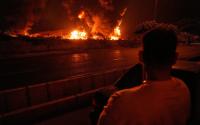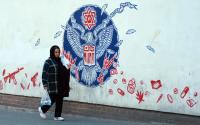12 January 2004Farnaz Fassihi
As Najim Abdulhussein huddled with his 17-year-old son during their first night of detention by U.S. forces last August, he was confident the Americans would soon realize they had made a mistake and free them.
Then, he says, a soldier pinned a sign that said "bombmaker" on his clothes and shipped the pair to the Abu Ghraib detention center, a once-dreaded prison of Saddam Hussein's regime now used by the U.S. occupation forces.
"At first I kept telling my son there has been a misunderstanding, we haven't done anything wrong, we will be released soon," says the 52-year-old grocer.
"But after we were taken to Abu Ghraib I thought I would never see my family again or be back inside my home."
Mr. Abdulhussein did make it home, although his son is still being detained. He was released last weekend in a group of detainees who were either arrested by mistake or are now believed to present no security threat, U.S. officials say.
Now that he is out, his account of detention provides a rare inside look at how the U.S. deals with Iraqis suspected of being insurgents. It also shows how the detention system, overwhelmed as it has grown to hold 9,500 Iraqis, can have trouble determining who is truly dangerous.
U.S. forces found materials in the small grocery adjacent to Mr. Abdulhussein's house that could be used to make explosives. The grocer, his family and neighbors say they were used to make helium balloons for children during Muslim holidays.
At Abu Ghraib, Mr. Abdulhussein says he was subjected to harsh interrogation. He says he was ordered to stand upright until he collapsed after 13 hours. U.S. interrogators, accusing him of being a terrorist who had trained in Afghanistan, once spat in his face and another time burned his arm with a cigarette, he says.
The specifics of his account could not be corroborated, since the only others present were U.S. interrogators whom the military declined to make available to a reporter. Mr. Abdulhussein's general descriptions of life in detention and the treatment he received were echoed by two men held with him. They say Mr. Abdulhussein would return from his rounds of interrogation deeply haggard, his clothes streaked with dirt.
A spokesman for the U.S. Central Command in Tampa, Fla., which oversees operations in the Middle East, Central Asia and the Horn of Africa, said that the U.S. military abides by the Geneva Convention and "doesn't condone the abuse of anyone that is detained." He referred a reporter to military officials in Baghdad for further comment. "They are closest to the events," he said.
Military and occupation officials in Iraq declined to comment specifically on Mr. Abdulhussein's case or allegations of abuse. They said that, if true, the alleged treatment would be excessive and unacceptable. They acknowledged that there has been allegations of unacceptably abusive questioning and that they are being investigated. "We receive them and they are brought to the attention of the military police and coalition authorities and taken very seriously," said Maj. Grant King, a coalition spokesman.
He said any incidents like that would not be "representative of the vast majority of military police but it's not out of the ordinary that one person would fall through the crack and decide he will make life hell for them."
Last week, the U.S. military announced it had discharged three soldiers for abusing prisoners in May at a different facility from where Mr. Abdulhussein was held. The soldiers knocked a prisoner to the ground and repeatedly kicked him in the groin and abdomen, according to the military.
In a report in July, the human-rights group Amnesty International voiced concerns about mistreatment of detainees by the Americans. The group said it had interviewed detainees who said they were made to stand hooded and upright until they collapsed. Others said they were kicked and hit, the group said.
The efforts of Mr. Abdulhussein's family to locate the grocer and his son after they were arrested during a middle-of-the-night raid on their Baghdad home were the subject of a story in The Wall Street Journal in September.
The family could get no information about the two men, despite international laws in the Fourth Geneva Convention that call on occupying powers to inform the family where detainees are being held and why. The family finally learned where the pair was being held from a man who showed up at their door more than a month later and told them he had encountered Mr. Abdulhussein at Abu Ghraib.
When Mr. Abdulhussein and his son Qutaibah were first arrested, they were taken to the Ghazaliah military base near their home. After the soldier pinned the bombmaker label on Mr. Abdulhussein, the pair were put in a van and transferred to Abu Ghraib.
There they were separated, Mr. Abdulhussein says. Qutaibah was taken to an adult camp for detainees considered to be a low-level risk. Mr. Abdulhussein was placed in Camp B, designated for high-risk detainees. It was filled mostly with former Fadayeen Saddam or Republican Guards -- men suspected of being the hardest of the hardcore insurgency. The detainees were kept in tents with thin carpets on the floor, says Mr. Abdulhussein. Some had mattresses and others did not. Each detainee was given a blanket and towel and issued a capture number and a tag, he says. Mr. Abdulhussein's new identity was "No. 150185."
In the 130-degree summer heat in August, the tents had no air-conditioning or fans. During the chilly desert nights of winter, there was no heat. Detainees were given winter coats, hats and gloves and extra blankets to keep warm, says Mr. Abdulhussein.
Shortly after midnight on the night he arrived, Mr. Abdulhussien says he was escorted into a circular outdoor area for his first interrogation. Three Americans and an Arabic translator sat on chairs before him. Mr. Abdulhussein was forced to kneel in the sand, his hands tightly bound with plastic cuffs. He says he was asked his name, address, education, profession and religion.
When he said he was a Sunni Muslim, they asked which mosque he attended and whether he was a follower of the Wahabi sect or had links to Osama Bin Laden.
One interrogator, he says, asked him why he looked like "an Afghan or an Iranian," with his long, bushy beard. The interrogators would often stand in front of him and shout questions. They sometimes shoved their fingers in Mr. Abdulhussein's face and threatened to beat him if he didn't look them in the eye. One interrogator insisted he had seen Mr. Abdulhussein in Afghanistan. "I told him I don't even have a passport, how did you see me in Afghanistan?" he says he replied. He was often threatened he would be shipped to Guantanamo Bay, where Al Qaeda prisoners are being kept, and promised he would never see his wife and children again if he didn't admit to being a terrorist. Once, in what he calls the worst interrogation session of all, he says the American soldier told him he was sending soldiers to his house to rape his wife. "I broke down and started crying like a child and begged him to stop," says Mr. Abdulhussein.
Mr. Abdulhussein says that during the hours-long interrogations, which took place every other day during the first few weeks, he had to hold his arms above his head and sit on the ground in an open field, in the summer heat while he was being questioned. Once an American interrogator asked if he was thirsty. When he nodded yes, the man poured a bottle of water on his face without letting him drink. He says on several occasions an interrogator pushed him to the ground, rubbed his face on sand and pulled at his beard.
Mr. Abdulhussein says that every time he answered a question, the interrogator would yell at him and accuse him of lying. "I would say, `I'm a Muslim, I don't lie,' and he would yell, `you are all liars.' "
Mr. Abdulhussein says that twice he met with representatives of the International Committee of the Red Cross, which the U.S. military allows to visit detention facilities and interview detainees. He says that on one occasion he complained about his interrogators' behavior.
Nada Doumani, a Red Cross spokeswoman, said she couldn't comment on any allegations received by the group, but when detainees informed the representatives of alleged mistreatment, the case would be promptly brought to the attention of the Americans.
Despite his hardships, Mr. Abdulhussein says there were many American soldiers who treated him well. At the field hospital, where he went for treatment of his epilepsy, the soldiers sometimes offered him a chair to sit on, or gave him clean bottled water.
Between grueling interrogations, Mr. Abdulhussein says day-to-day life fell into a routine. He shared a tent with 20 other detainees and slept on a thin mattress in a corner. He woke up every day at 5 a.m. and prayed. Then he walked around the tents outside and chatted with other detainees. He got used to eating the army's Meals Ready to Eat packages, he says. The American guard told the detainees to avoid packages labeled Nos. 2 and 22 because they were pork meals forbidden under a strict Muslim diet, he says.
They were allowed to shower -- with cold water in portable military showers -- once a week in the high-risk camp and once every other day in the lower-risk one.
Obtaining clean water was difficult, says Mr. Abdulhussein. A truck brought a container of tap water to the camp and the younger detainees always rushed to fill plastic jars. But the water was muddy and tasted foul, says Mr. Abdulhussein. He did his best to purify it by filtering it through one of his socks.
One day in October, a few weeks after the Journal's story about his family was published, Mr. Abdulhussein was summoned again. This time, though, the interrogators were unfamiliar to him.
They smiled at him sometimes and offered him a chair and spoke to him in a cordial manner. That had never happened before. They told him they were trying to determine why he was being detained and said it wouldn't be long before he saw his family again, he says.
Within a week, Mr. Abdulhussein was transferred to Camp 6, an area designated for the low-risk detainees. He was reunited with Qutaibah. When the father and son hugged each other inside the tent, he says everyone around them was crying.
Mr. Abdulhussein first made contact with his family in mid-November when he was taken to the camp's field hospital operated by Iraqi doctors. He was hospitalized for 35 days and asked the Iraqi doctor who treated him to go to his home and deliver a note to his wife.
After the capture of Saddam Hussein, which the detainees learned about from their American guards, Mr. Abdulhussein says the Americans began releasing more detainees. Three times a week -- on Saturdays, Tuesdays and Thursdays -- a U.S. soldier read out the capture tag numbers of those who were set free. Last month, rarely were more than four or five men freed, said Mr. Abdulhussein. In recent weeks, the number skyrocketed to 30-50 names at a time. U.S. military police who work inside the camp confirm that more detainees have been released after the capture of Saddam Hussein.
With no warning, Mr. Abdulhussein's number was called last Saturday night. It's unclear when or if his son Qutaibah will be released, but the family ishopeful that it will be any day.
Mr. Abdulhussein and 90 of his fellow detainees were piled into the back of three trucks driven by American soldiers. They were released beside the highway to Baghdad. With no money in their pockets and no means of transportation home, the group waited several hours until one by one they hitchhiked rides to the city.
When he returned home, his wife cried uncontrollably, and his 4-year-old twins clung to his knees. A family member went to school to fetch Mr. Abdulhussein's 14-year-old son, Mohammad, who had done his best to mind the family's small grocery in his father's absence.
Mohammad ran home so fast that he lost his shoes and his schoolbooks on the way. By the time he arrived, his shirt was soaked with tears.






